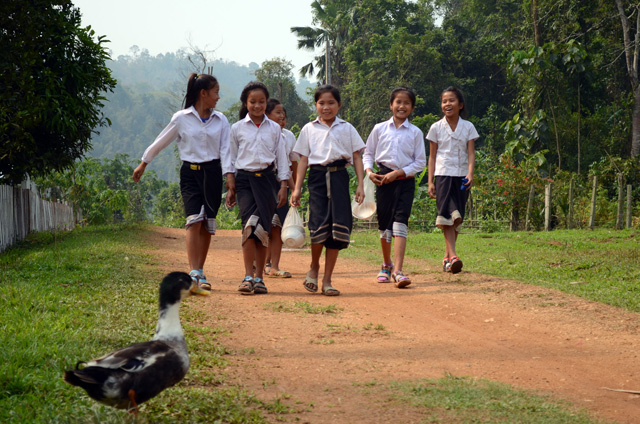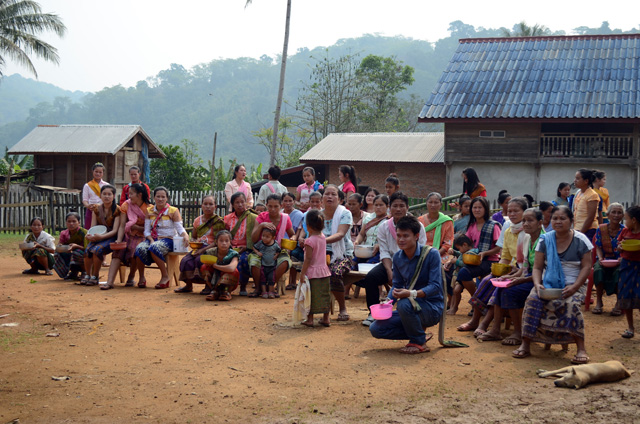XAYABOURY PROVINCE, Laos (MindaNews/30 April) — A distant small village woke up to loud Lao and Thai music on the first day of Pii Mai or the Lao New Year.
Permeating throughout Natoung village on a Monday morning, the music came from a battery-run speaker mounted on the village’s meeting room.
As sunlight slowly dissolved the morning mist that enveloped the village, the ruckus of people doing morning chores took over; but it was not their usual going to their farms or house repairs.
Most of them were inside either their houses or their neighbors’ holding a Baci. This is a thanksgiving ritual for family and friends.
“Yu dee mee heng” which means “may you have strength” was one of the sayings they would utter while tying strands of white thread around a person’s wrist.
The Baci was always followed by a humble meal and drinking of Lao khaoniew (whiskey made of sticky rice) and warm beer. Yes, warm beer! Ice cubes would definitely melt before they could reach the village. And, no one can afford to use a refrigerator with the limited capacity of their generators or solar panels. And, yes, the drinking could start earlier than breakfast time.
But, many began the new year in a more traditional way like 22-year old college student from Vientiane, Mr Somphong Chanmanivong (nickname Phong). He arrived in the village two days ago to visit his family.
Phong put on his clean shirt and long pants, and hung a piece of cloth on his left shoulder like a sash.

Students of Ban Natoung Lower Secondary School wear their uniforms on a holiday for a Baci at the school.
Then, he went to a public water tub where he met some neighbors. Doing the same thing as they did, he stirred a bit of powder soap in a pink plastic dipper, and dropped a few petals of “Dokjum pa” (Lao national flower) in it.
The fragrant water would later be used to wash the Buddha statues. Lao people believe that by washing off the dust gathered on the statues through the dry season, they were symbolically cleansing themselves in the spiritual sense. Being cleansed means deserving to receive new blessings. That’s why they also poured the excess water to other people and wished them for all the good things that the world can offer.
“Why don’t people go to the temple today? It is important to keep the tradition,” Phong said in English as he walked towards the wooden Buddhist temple, carrying his pink dipper. Studying for his degree at the National University of Laos in Dongdok, Phong is one of the few people in the village who can communicate in English.
Along with him those who can manage to carry a conversation with foreigners are Mr Thin and Mr Souk, who are teachers in Ban Natoung Lower Secondary School. Mr Thin, 27, who is also the school’s Deputy Director, has been learning English language for six months now. His tutor is Mr Souk, 25, who has a diploma in English from the teachers college in Ban Kuen.
These three young men have realized the importance of learning English as a tool to improve their economic condition.
Elevated by four posts, the temple was already crowded inside with some 20 people. When Phong arrived, he was surprised that many villagers had been gradually filling up the compound because the small building could not hold everyone.
Everyone held either a dipper or pail of scented water. Both the women in their Lao sinh (traditional skirt) and men in trousers wore a sash of cloth. It could be a woven scarf, a curtain, a table mat or a towel.
Amid the rising summer heat, the children amused themselves, sometimes with plastic water guns.
An old thin monk in orange gown was hosting a ceremony inside the temple. The people downstairs could barely hear his chanting.
As it ended, a group of men from upstairs brought down small statues of golden Buddha and placed them on an improvised altar. Soon after, the villagers began bathing the statues. The flowers fell on the platform.
And, the people who received more wishes and prayers from others were the ones ending up totally wet.
The “Heralds”
Later the same day, the students, their parents and teachers, including Mr Thin and Mr Souk gathered at the teachers’ dormitory near the school. Unlike the new wooden dormitory, the school which is composed of two tiny houses with roofs made of dried palm leaves and walls of woven bamboo slats. A few weeks earlier these buildings had been severely damaged in a storm. Although the government has begun building a new brick school it is a long way from completion so classes are being held at the temple and some people’s homes.
They had prepared a Baci for Phong, Mr Ian Tait and me. Mr Tait is an Australian volunteer writer who’s been working with Vientiane Times for several years. He was the first foreigner many of the villagers had ever seen when he visited last October with Phong.
Phong is one of the few villagers who have experience of living and studying in Vientiane. Even most of the teachers were born and raised locally and returned to their home village when they finished their training and have little experience of the wider world. But their students wore printed shirts and fashion from a global culture, like Thai movie actors, which they poorly understood.
They’re literally out of the grid. No network signal or radio frequency. But they have a big black sound box that plays mp3s. The boys carry them from one house to another, whichever could spare an electric power.
It was our third Baci since we reached the Paklaydistrict. The first one was at Mr Souk’s house in Ban Nakhan, the village before Natoung. The second one was at Phong’s house. Imagine how thick the white strings around our wrists!
It was the people’s dearest way to thank us for donating hundreds of new books to their school last year.
The school director, Mr Thongsien, wrote in his notebook a message in Lao language that Mr Souk translated for us. It said that they wanted us to seek more help from others to improve their school.
 Phong (front), holding his pink dipper, waits for the Lao new year ceremony to finish among the villagers outside the temple.
Phong (front), holding his pink dipper, waits for the Lao new year ceremony to finish among the villagers outside the temple.
Their kindness to us showed that we were not mere visitors, observers or tourists. Like Heralds, we were carriers of their aspirations and dreams. We were a part of their hopes.
However, it is really young people like Phong who carry them. He had the ambition to leave his village and study in Vientiane and will use the skills he learns to teach and help his community to advance, not us. It is the Phongs of Laos that will have a real impact. (With Ian Tait, Australian volunteer)
(Lorie Ann Cascaro of Mindanews is a fellow of FK Norway exchange program. She’s currently in Laos and hosted by Vientiane Times.)
